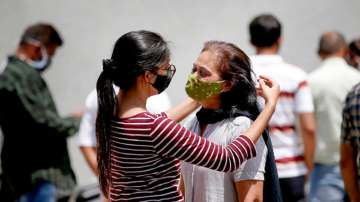The very infectious strains of coronavirus, B.1.617 and B.1, are currently found in the COVID-19 positives in Andhra Pradesh, Karnataka and Telangana and spreading fast in younger age groups, apart from adults.
The N440K is neither a 'variant of interest' nor is virulent now, the state Health Department has said quoting a study by the Centre for Cellular and Molecular Biology.
"The major strains identified from the samples of south India (AP, Karnataka, Telangana), from the positives of the April month data, are B.
1.617 and B.1, which are very infectious and also spreading in the younger age groups apart from the adults.
It is pertinent to note that COVID-19 Weekly Epidemiological Update of April 25, issued by WHO, mentions about lineage B.1.617 as VOI (Variant of Interest) from India and doesn't mention about variant N440K," AP Covid Command and Control Centre Chairman K S Jawahar Reddy said in a statement.
Genome sequencing was carried out in CCMB, Hyderabad, for the samples collected from AP, Telangana and Karnataka.
On average around 250 samples are being sent to CCMB from the labs of AP every month.
"N440K Strain of coronavirus (B.1.36) was detected in June-July 2020. This strain was prevalent in December 2020 and January and February 2021 and dropped down drastically in March.
Now the share of N440K among the positives is very minimal," Jawahar Reddy pointed out.
He said research data so far did not establish that N440K was a variant of interest and very virulent.
"If this variant is of such public health concern, it should have by now found a place in WHO as well as ICMR reports," he noted.
The Special Chief Secretarys statement came in the backdrop of reports, both in the media and social media, that the N440K variant of coronavirus was rampant in Andhra Pradesh and causing fatalities, besides a higher infection rate.
Latest India News
